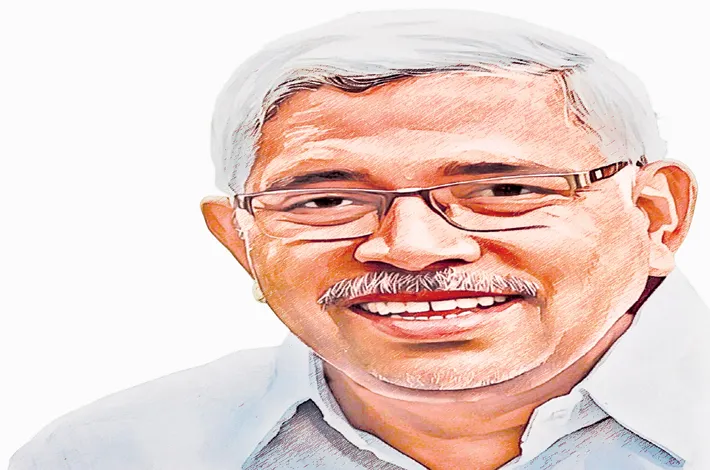The Rise & Fall of Kodandaram
01-11-2025 12:00:00 AM

metro india news I hyderabad
In the annals of Telangana's hard-fought birth, one name echoes like a battle cry: Prof Kodandaram, or simply "Kodanram Sir" to those who marched beside him. Once the unassailable chairman of the Joint Action Committee (JAC), he was the moral compass of a movement that bled for dignity, leading a chorus of millions against the chains of an undivided Andhra Pradesh. Today, as whispers of his faded glory swirl through the streets of Hyderabad, Kodandaram stands at a crossroads—not of power, but of purpose. His story is a heartrending ballad of triumph turned to twilight, a reminder that even the mightiest flames can flicker if not fanned by the people's breath.
It was a decade ago, in the sweltering heat of 2011, when Kodanram's voice first cracked the foundations of injustice. As JAC chairman, he wove together the fractious threads of Telangana's political tapestry—Congress, TDP, BJP, and beyond—into a single, unbreakable weave. His word was gospel; his call to arms, a sacred vow. Remember the Million March? Under a sky bruised by police batons and tear gas, Kodanram stood unflinching, his frail frame a fortress for the dreams of the dispossessed. "We are not asking for a state," he thundered that day, his eyes alight he roared, “we are reclaiming our soul." The oppression was brutal—lathis rained down, voices were silenced—but Kodanram's resolve turned despair into defiance. State leaders trembled; Delhi's corridors buzzed with his counsel. International headlines, from BBC to The New York Times
Times, hung on his every syllable, portraying him not as a mere activist, but as the philosopher-king of a people's uprising. When Telangana rose from the ashes on June 2, 2014, like a phoenix etched in the blood of its martyrs, many envisioned Kodanram as its eternal sentinel—a watchdog, fierce and free, holding the new government's feet to the fire of its promises. He had no throne to claim, no coffers to fill; his currency was integrity, his armor honesty. But the winds shifted cruelly. K Chandrashekar Rao (KCR), the architect of victory, began to sideline him, a cold war brewing in the shadows of Secretariat. What began as polite distance curdled into outright hostility.
Kodanram's pleas for dialogue were met with iron fists: house arrests that felt like sieges, police storming his home like invaders, terrorizing his family, treating the man who birthed a state like a common felon. Echoes of Revanth Reddy's own ordeals under the previous regime rang hollow; history, it seemed, had a cruel habit of repeating its cruelties.
Undeterred, Kodandaram birthed the Telangana Jana Samithi (TJS) in 2017, a beacon for the betrayed ideals of the movement. Allied with Congress and TDP, it stormed the 2018 Assembly polls, a David against Goliaths.Still, the groundswell faltered; seats slipped away like sand through fingers. In 2023, he threw his weight behind Congress, endorsing Revanth Reddy's ascent with the quiet faith of a mentor passing the torch. Promises flowed like monsoon rains: a nod toward an MLC berth, a seat in the legislative council to amplify the voiceless. But judicial shadows loom now, and the berth remains a mirage, leaving Kodanram adrift in a sea of unkept oaths.
To those who once swelled stadiums at his beckoning, this fall is a dagger to the heart. "He was our North Star," recalls an elderly marcher from the Million March, her voice cracking over a cup of chai in a Secunderabad tea stall. "Now, he knocks on ministers' doors—Poonam Prabhakar, others—begging for scraps of justice for the very activists he once led. It's like watching a lion reduced to a lapdog." The corridors of power, once alive with his footsteps, now echo with indifference. TJS, meant to be a thunderbolt, has dimmed to a spark. His image, once towering, feels tarnished—not by malice, but by the slow erosion of compromise. "Had he bent to KCR," sighs a former JAC colleague, eyes misty with regret, "a Rajya Sabha seat would have been his years ago. But Kodanram Sir doesn't bend; he breaks, and it pains us to see the cracks."
But in this elegy of loss, there glimmers a redemption as profound as his past valor. Voices from the grassroots—students in Osmania's shadowed halls, farmers in the parched fields of Mahabubnagar, workers in the factories of Patancheru—urge him to reclaim his essence. Dismantle TJS, they plead, not as a party, but rebirth it as a social bulwark, untethered from electoral chains. Distance from the Congress's embrace, from any throne that smells of patronage. Become the heir to Prof. Jayashankar's mantle: the Ideologue of Telangana's dream, who wielded intellect like a scythe against corruption, never craving a crown.
Imagine it—Kodanram, the honest sentinel, igniting a people's inferno against the plunderers. The Andhra contractors and businessmen, those spectral giants who slither across borders, siphoning Telangana's coffers with the complicity of the mighty. Launch movements for the unemployed youth, their futures bartered for votes; for the beleaguered employees and farmers, crushed under debt's unyielding boot. "Derive your power from the people, not the powerful," one young activist implores in a viral post, her words a salve to the movement's soul. No MLC seat, no ministerial nod—just the raw, roaring mandate of the masses.
Telangana's story is unfinished, its heroes human. Prof. Kodandarami's odyssey—from the frontlines of glory to the quiet margins of marginalization—is a mirror to us all: a caution against the seductions of power, a clarion for reinvention. Will he heed the call, dismantle the vestiges of politics, and march anew? In the hearts of those who remember the Million March's thunder, hope endures. For in Kodanram Sir, the spirit of Telangana still breathes—wounded, perhaps, but waiting to roar once more.








